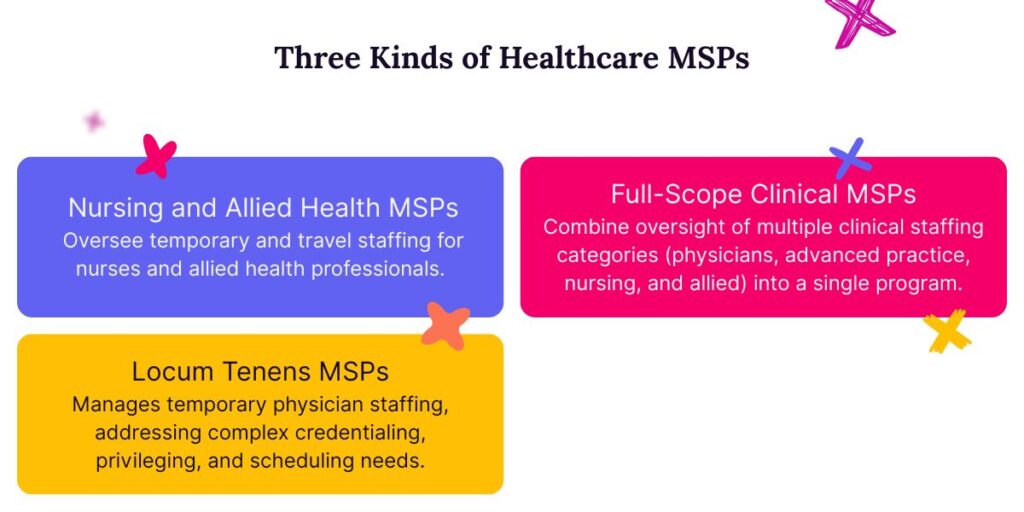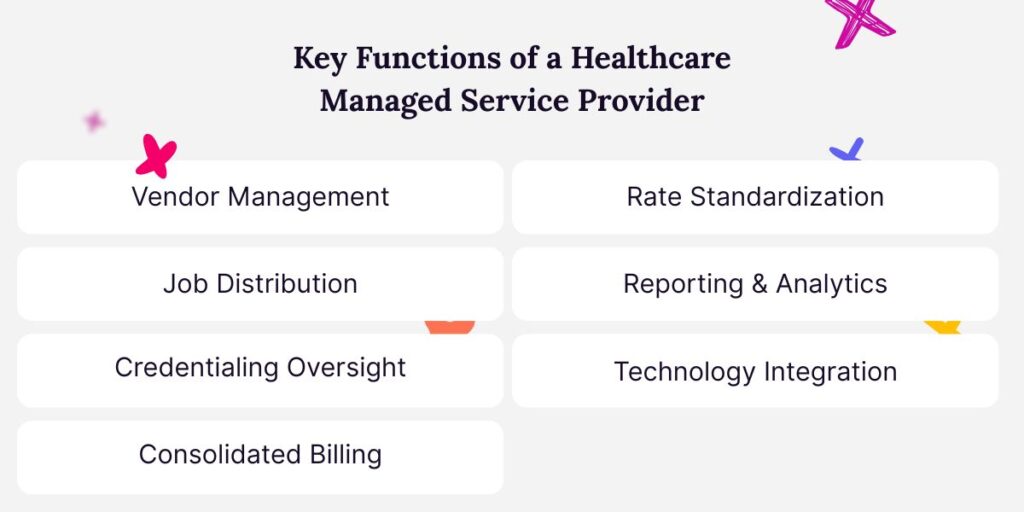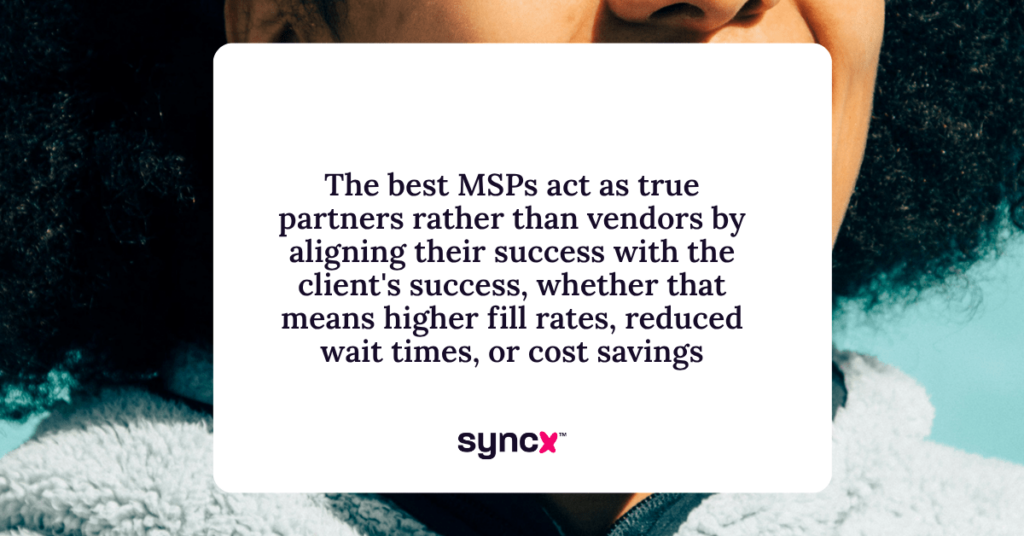In the healthcare industry, “MSP” stands for Managed Service Provider—a specialized partner that helps healthcare organizations optimize their staffing or operational processes. Unlike general MSPs that serve a broad range of industries, healthcare-focused MSPs are well-versed in the unique challenges of the field, from strict compliance requirements to the need for seamless, secure patient care.
Healthcare MSPs handle things like managing provider coverage gaps, coordinating multiple staffing agencies, or standardizing workforce operations, making them an extension of an organization’s team. Let’s find out how you can use them to help ensure efficiency, visibility, and scalability in an ever-evolving industry.
What Is a Managed Service Provider?
A Managed Service Provider (MSP) is a third-party company that delivers ongoing staffing support. Instead of handling recruiting and hiring in-house, organizations partner with MSPs to access specialized services. MSPs offer a combination of software solutions and human experts. Common MSP services include:
- Access to a VMS Tool
- Staffing & Workforce Solutions (temporary providers, permanent placements)
- Revenue Cycle Management (invoicing & claims processing)
- Compliance & Risk Management (licensing, credentialing, privileging)
What Types of Healthcare MSPs Exist?
In the context of healthcare staffing, MSPs are typically focused on managing clinical workforce operations by helping hospitals and health systems ensure consistent, cost-effective coverage across departments and roles. The most common types include:
- Nursing and Allied Health MSPs – Oversee temporary and travel staffing for nurses and allied health professionals. These MSPs help streamline agency coordination, credentialing, and compliance, often using a VMS (Vendor Management System) to manage job postings, submissions, and reporting.
- Locum Tenens MSPs – Specialize in managing temporary physician staffing, addressing complex credentialing, privileging, and scheduling needs. Given the unique nature of physician staffing, these MSPs often require purpose-built workflows that go beyond traditional travel nurse models.
- Full-Scope Clinical MSPs – Combine oversight of multiple clinical staffing categories—physicians, advanced practice, nursing, and allied—into a single centralized program. These MSPs provide broad workforce visibility and scalability, helping health systems reduce reliance on siloed vendors or internal teams.

Why Do Hospitals Use Managed Service Providers?
At its core, a Managed Service Provider (MSP) exists to optimize efficiency, reduce costs, and mitigate risks so healthcare organizations can focus on patient care rather than back-end operations. Using a healthcare MSP for staffing has several primary benefits, including simplifying working with multiple agencies and reducing administrative overload. The right healthcare MSP partner, however, should also help you increase transparency around staffing performance and cost. They should also improve compliance and documentation tracking together with strategic planning through real-time data and reporting.
In short, MSPs help healthcare organizations manage workforce complexity with greater efficiency while maintaining high standards of care.
How Are MSPs That Support Healthcare Clients Unique?
Not all MSPs are created equal. Those serving healthcare face higher stakes and tighter onboarding restrictions. Healthcare-focused MSPs must navigate credentialing standards, licensing requirements, and privileging processes. A single misstep can disrupt care, delay coverage, or expose the organization to legal risk.
Unlike generic workforce solutions, healthcare MSPs specialize in provider staffing in order to bolster coverage for clinical roles like physicians and advanced practice providers. They understand the nuances of credentialing, onboarding, and shift-based deployment, offering hospitals and health systems the flexibility to scale up quickly in times of need.
Whether responding to seasonal demand surges, supporting internal float pools, or integrating with credentialing platforms, healthcare MSPs operate with the urgency and precision required to keep care continuous and compliant, without overburdening internal teams.
💡 Clarifying MSP vs. VMS
An MSP is the strategy, people, and processes behind workforce management. A VMS is the technology that supports it—tracking jobs, managing agency submissions, and providing transparency into staffing performance. A strong healthcare staffing MSP will typically operate a VMS, but the two are not interchangeable.
Managed Service Providers for Staffing & Locum Tenens
Locum tenens—a Latin phrase meaning “to hold the place of”—refers to temporary clinicians who step in during vacancies, leaves, or surges in patient volume. Locum tenens MSPs specialize in sourcing, credentialing, and managing these professionals, ensuring compliance and seamless integration into care teams. Beyond physicians, these MSPs also place advanced practice providers and specialists like CRNAs, allowing facilities to maintain continuity of care without overextending their core staff.
Key Functions of a Healthcare Managed Service Provider
- Vendor Management: Coordinates all staffing agencies (vendors), ensuring standardized contracts and compliance.
- Job Distribution: Posts open roles across a network of agencies to maximize candidate reach.
- Credentialing Oversight: Tracks and helps manage the credentialing process for locum providers.
- Consolidated Billing: Provides a single invoice and payment process, reducing administrative burden.
- Rate Standardization: Enforces pre-negotiated rates with agencies to help control costs.
- Reporting & Analytics: Offers visibility into spend, fill rates, agency performance, and utilization.
- Technology Integration: Often includes or integrates with VMS (Vendor Management System) platforms.

How Does MSP Pricing Work?
Managed Service Providers in healthcare structure their pricing to align with the unique needs and constraints of medical organizations. Rather than rigid, one-size-fits-all models, most offer flexible arrangements that scale with an organization’s size and requirements. The cost structure typically reflects whether the MSP is a VMS-only or a full MSP program.
- VMS-only pricing (technology-only): May have a platform or per-shift fee.
- Full MSP programs (people + process + platform): Typically agency-funded, meaning health systems don’t directly pay the MSP a fee. The cost is built into the agency markup and includes broader services like credentialing, reporting, rate management, and coordination.
Are Managed Service Providers Worth It?
While top-tier MSPs deliver transformative value, the field has developed some reputation challenges that stem from a few key issues. Some providers overpromise capabilities, particularly when crossing over from other industries without proper healthcare expertise. The staffing MSP sector in particular has faced criticism when temporary clinicians don’t meet quality standards or when billing markups aren’t adequately transparent.
Yet these cautionary tales shouldn’t overshadow the tremendous value the right MSP can bring. A strong MSP provides transparent reporting that proves ROI rather than just asserting it. Their contracts include clear performance benchmarks with remedies for underperformance. Perhaps most importantly, the best MSPs act as true partners rather than vendors by aligning their success with the client’s success, whether that means higher fill rates, reduced wait times, or cost savings.
A good MSP will staff their team with professionals who speak both the language of healthcare and the language of their specialty, whether that’s workforce management or revenue optimization. For healthcare organizations feeling overwhelmed by staffing shortages, regulatory burdens, or technology demands, finding such an MSP partner can mean the difference between struggling to maintain the status quo and achieving transformative operational improvement.

Why Work With an MSP for Locum Tenens?
Healthcare staffing isn’t just about filling gaps—it’s about ensuring continuity of care without compromising quality or burning out your core team. That’s where a specialized Locum Tenens Managed Service Provider (MSP) makes all the difference. Instead of juggling multiple staffing agencies, scrambling for last-minute coverage, or drowning in credentialing paperwork, an MSP acts as your single point of contact for seamless workforce solutions.
With deep expertise in clinician placement, compliance, and scheduling, a locum tenens MSP like Syncx transforms staffing from a constant challenge into a strategic advantage. We handle the heavy lifting, so you can focus on what matters most: delivering exceptional patient care.
Discover the Syncx difference. Our customers saw up to 20-30% savings compared to agency spend as well as a 3-7% decrease in average locum bill rates.
Healthcare organizations like yours are reducing costs, improving fill rates, and gaining peace of mind with a true staffing partner. See how with a free demo!
